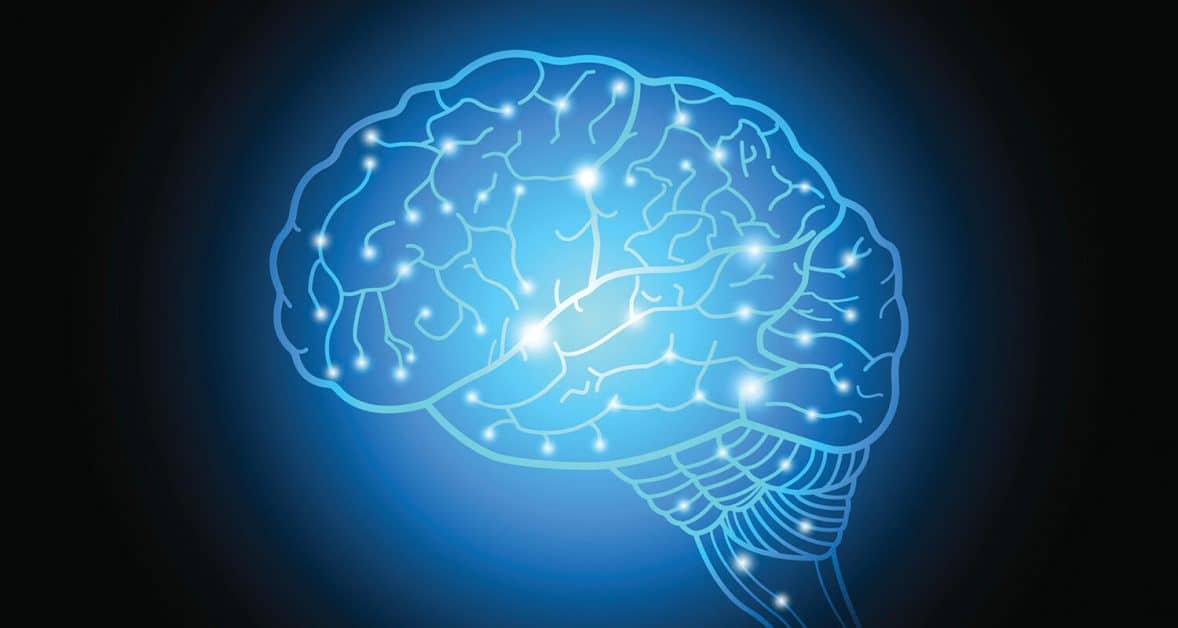
What Is Dopamine And What Does It Do?
Dopamine is a neuromodulator that acts as a messenger between neurons. It determines the amount of motivation and drive to achieve something and leave our comfort zone.

In an age where mental health awareness is at an all-time high, anxiety stands out as a particularly pervasive issue, touching the lives of millions globally.
As the quest for effective treatments continues, many find themselves navigating the complex terrain of pharmaceutical interventions, only to encounter mixed results and, at times, undesirable side effects.
This has led to a renewed interest in complementary and alternative medicines, including dietary and herbal supplements, as potential avenues for relief.
This article delves into the realm of evidence-based supplements, overviewing five natural remedies that have shown promise in the battle against anxiety.
Drawing from centuries-old traditional medicine practices and bolstered by contemporary scientific research, these supplements offer a beacon of hope for those seeking to manage their anxiety more holistically.
From the calming effects of passionflower to the mood-stabilizing properties of St. John’s Wort, and the potential of amino acids and magnesium to rebalance brain chemistry, we explore the efficacy, safety, and scientific backing of each supplement.
Depression and anxiety rank among the most prevalent mental health disorders, impacting close to 55 million individuals across the United States. Despite their widespread occurrence, the treatment of anxiety presents significant challenges, largely attributed to the complexities involved in accurately identifying its root causes.
While some scientists think that imbalances in brain chemicals like serotonin, dopamine, and GABA might be linked to anxiety and depression, there’s no solid proof yet. This uncertainty is one reason why antidepressant medications don’t always work well for anxiety.
The most common pharmaceutical alternative, Cognitive Behavioral Therapy (CBT), has been found to be a very effective way to deal with anxiety over the long term, suggesting that therapy focusing on changing thought and behavior patterns might be a key solution for those struggling with anxiety.
Yet even (CBT), heralded for its effectiveness, boasts only a 50-75% success rate, compelling researchers to continue the search for alternative treatments.
Besides antidepressants, doctors commonly prescribe serotonin-specific reuptake inhibitors (SSRIs) and benzodiazepines to those with Generalized Anxiety Disorder (GAD).
While these medications can be helpful, they are not without their drawbacks: common adverse effects of SSRIs, for example, have included impaired sexual functioning (56%), drowsiness (53%), weight gain (49%), dry mouth (19%), insomnia (16%), fatigue (14%), nausea (14%), and dizziness (13%). The ongoing cost of these medications also poses a challenge for patients who need to take them regularly over a long period.
Benzodiazepines are a type of medication known for their calming effect. They work by enhancing the effect of the neurotransmitter GABA in the brain, helping reduce anxiety, ease muscle tension, and promote sleep. However, their potential for dependency and withdrawal symptoms makes their long-term use controversial.
Given these concerns, there’s growing interest in exploring complementary and alternative medicines (CAM) as natural ways to treat various forms of anxiety.
For centuries, herbs like passionflower, kava, St. John’s wort, and valerian root, along with the amino acids lysine and magnesium, have been used in traditional medicines to soothe the mind and improve mood.
Only in the last 10 to 15 years have these methods begun to be thoroughly investigated in clinical trials for their effectiveness and safety in treating anxiety, both as a symptom and as a disorder.
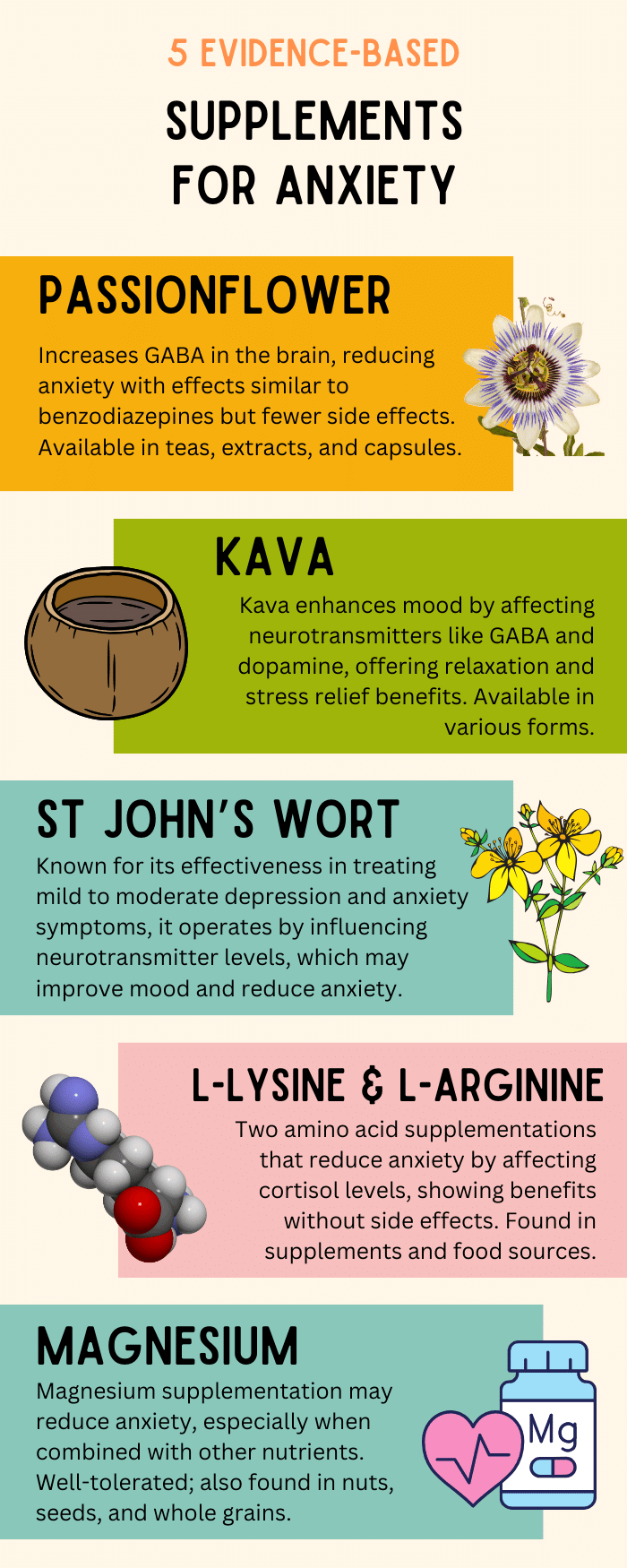
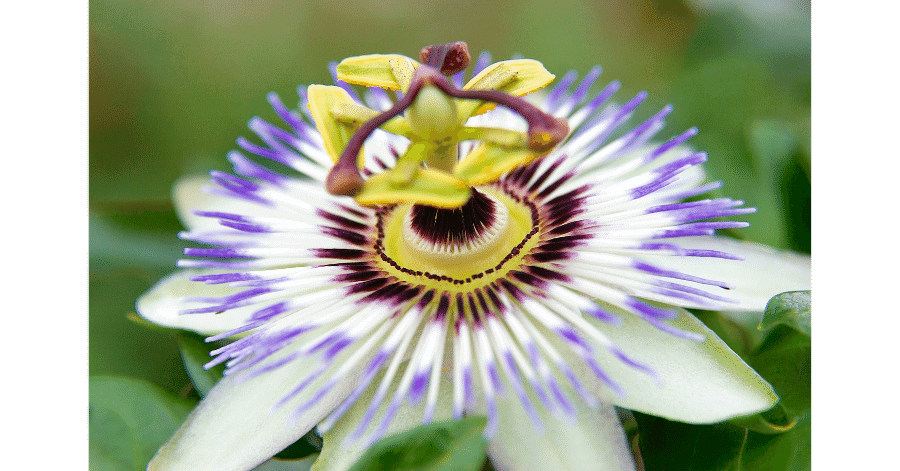
Passionflower, scientifically known as Passiflora incarnata Linn, is a plant renowned for its medicinal properties and has a long history of use as an anxiolytic (anti-anxiety) agent in traditional medicines.
The compounds in passionflower are believed to work by increasing levels of gamma-aminobutyric acid (GABA) in the brain, an inhibitory neurotransmitter that helps reduce nerve activity in the brain, which can lead to relaxation of the nervous system and better sleep.
The anxiolytic effects of passionflower are well documented in mice where a dose of 10 mg/kg reduced signs of anxiety when subjected to a maze-type puzzle.
One study aimed to measure the effect in humans by analyzing the difference in efficacy between passionflower and oxazepam, a prescription benzodiazepine used to treat chronic anxiety symptoms.
The results showed no difference between the two anxiolytics on anxiety disorders, suggesting that passionflower is as effective as benzodiazepines in eliminating anxiety symptoms.
Interestingly, subjects from the passionflower group reported lower job impairment performance than those in the benzodiazepine group. Those in the benzodiazepine group, however, reported a faster onset of symptom relief.
Interpreting these results is more difficult, however, as plant material and herbal supplements contain thousands of phytochemicals, making it challenging to pinpoint the specific components responsible for the anxiolytic effects. More research is needed to determine the specific ingredient that produces this result.
Whereas antidepressant drugs are notorious for their side effects, which can be worse than the underlying symptoms they are trying to treat, mild adverse events from passionflower use were reported in only one study, which included dizziness, drowsiness, and confusion.
While more research needs to be done, the current data suggest that passionflower is no less effective than common benzodiazepines, with the potential advantage of presenting fewer and less severe side effects.
Passionflower can be consumed in various forms, including tea, extracts, capsules, tablets, and tinctures. The most common is tea, however, where you take passionflower herb (about one teaspoon) and steep it in boiling water (about 1 cup) for 10 minutes before straining and drinking.
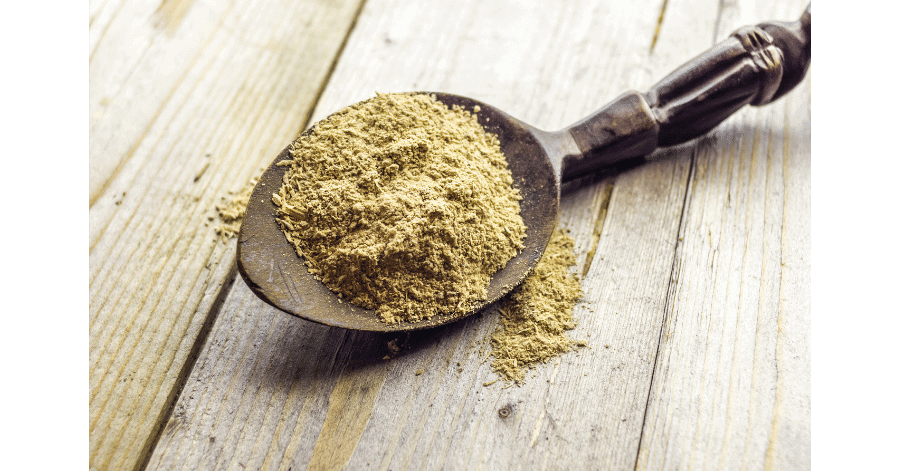
Kava, also known as kava kava or by its scientific name Piper methysticum, is a plant native to the South Pacific islands. It has a long history of use among Pacific Island cultures as a ceremonial drink for its psychoactive properties.
The active ingredients in kava are called kavalactones. These compounds are thought to affect the brain and central nervous system, potentially through modulation of neurotransmitter levels, including GABA and dopamine.
The attractiveness of kava is that it is anxiolytic but not sedative or mentally impairing, which are typical side effects caused by benzodiazepines, meaning it can be taken without fear of drowsiness or impact on mental performance.
The excitement for using kava as a treatment for anxiety started after this study found that participants who were given the kava extract showed a greater improvement in their primary and secondary anxiety symptoms over a placebo control. The researchers also concluded that when kava is used as an anxiolytic alternative to benzodiazepines or tricyclic antidepressants, individuals typically suffer fewer side effects.
Since then, however, four RCTs showed that kava alone or in combination with St John’s wort is no more effective than placebo in reducing symptoms of anxiety, with one study actually finding the placebo was better at reducing anxiety symptoms than kava in patients with higher baseline anxiety scores.
Research has generally shown that Kava can help with temporary anxiety in people without clinical anxiety disorders, suggesting it might be useful for short-term stress relief. However, newer studies indicate that Kava does not effectively treat diagnosed generalized anxiety disorder, but results are still mixed.
These studies also indicated that doses of kava below 400 mg/day do not typically lead to severe side effects. This finding is particularly noteworthy in light of the U.S. Food and Drug Administration’s (FDA) 2002 consumer advisory, which warned about the risk of significant liver damage associated with supplements containing kava.
Kava can be taken in tea form, using kava root or pre-packaged tea bags. Steep in hot water for about 5 to 10 minutes before drinking. For those who do not enjoy the taste of kava, capsules, and liquid tinctures offer a convenient alternative. Follow the dosage instructions on the product label.
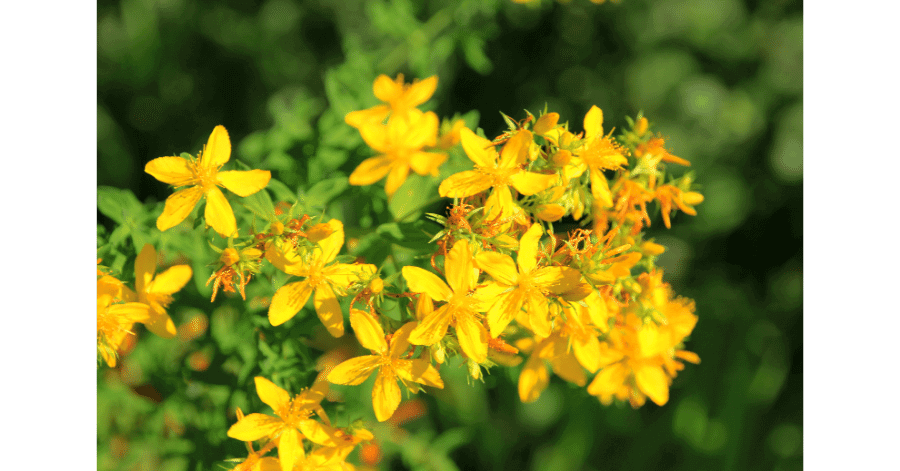
St John’s wort (SJW), or hypericum perforatum, is a plant derived from the flowering tops of a perennial shrub known for its potential benefits in treating mild to moderate depression and certain other mood disorders.
It became popular as a natural treatment for depression after a 1996 meta-analysis showed that St John’s wort was more effective than a placebo in treating mild to moderate clinical depression.
From then, researchers began comparing the efficacy and safety profile of SJW against other routinely prescribed antidepressants, with one trial concluding that it was as effective as imipramine, a common tricyclic antidepressant at the time, in treating mild to moderate depression.
A small 12-week observational study of patients with Obsessive Compulsive Disorder (OCD) showed that SJW caused significant improvements, with results comparable to those seen in clinical trials with SSRIs.
A similar RCT of 149 patients with depression with co-morbid anxiety, OCD, and somatization disorder demonstrated that six weeks of treatment with SJW significantly reduced anxiety.
A further study found that using a combination of St. John’s Wort (SJW) and valerian (a similar herb) led to a notable decrease in symptoms of anxiety disorders.
However, it was observed that larger doses of valerian, while keeping the SJW dose consistent across treatment groups, resulted in more significant symptom reduction, implying that valerian, rather than SJW, plays a more substantial role in alleviating anxiety symptoms.
Some studies have found the benefits of SJW contradictory, however. A larger 12-week RCT on 60 participants showed no significant difference between patients treated with SJW or those treated with placebo.
In a comparable randomized controlled trial involving 40 patients with generalized social anxiety disorder, St. John’s Wort (SJW) did not outperform a placebo in lessening anxiety symptoms. The researchers of this study, in their discussion, acknowledged that the trial yielded negative results, but theorized that for SJW to be effective in this group of patients, there might be a need for a certain level of minimum severity in their symptoms.
Again, St John’s wort can be prepared into a tea by steeping 1-2 teaspoons of dried herb in a cup of boiling water for about 10 minutes or taken in capsule form.

It has long been thought that the dysregulation of neurotransmitters such as GABA, serotonin, dopamine, and norepinephrine may be a cause of anxiety.
As a result, researchers have looked toward amino acids, such as L-tyrosine and L-tryptophan, that are known precursors for these neurotransmitters.
L-lysine has been found to interact with a specific part of the brain’s signaling system, known as the serotonin receptor 4 (5-HT4). By acting as an antagonist, meaning it blocks or reduces the activity of this receptor, L-lysine helps to lessen the body’s reaction to stress that involves both the brain and the gut.
It has been observed to lower the levels of cortisol, a hormone that is often released in response to stress, in the blood, helping to reduce the overall stress response in the body.
The findings of this study indicated that supplements combining L-lysine and L-arginine were effective in enhancing the participants’ capacity to manage stress that was artificially induced, as evidenced by an increase in cortisol levels. In contrast, those who took a placebo did not show any notable improvement in their anxiety symptoms.
A second study recruited 108 healthy Japanese individuals. After one week of treatment with an oral L-lysine and L-arginine supplement, cortisol levels decreased in males but not in females, an oddity thought to be due to participants not being selected based on high trait anxiety.
The researchers explained that the rise in cortisol levels might be due to a prior problem with how stress hormones are controlled. Earlier research showed that in people who are usually very anxious (high-trait anxiety), cortisol levels don’t rise as they normally should during stressful situations. This improper management of cortisol can make people feel even more anxious when stressed.
Taking the supplements also led to a noticeable decrease in both short-term anxiety (the kind of nervousness and worry you feel about a particular event or situation) and general anxiety (the overall tendency to feel anxious), for both men and women.
For the above studies, it seems that the L-lysine and L-arginine combination effectively reduces anxiety with no reported side effects. As an additional benefit, amino acid supplements may also help in balancing cortisol levels triggered by stress in both healthy individuals and those with high trait anxiety.
While L-lysine and L-arginine can both be taken in supplement form, dietary sources can be found in foods like meat, fish, dairy products, legumes, and nuts.
Incorporating a balanced mix of these foods can help ensure adequate intake of both amino acids.

Magnesium is essential for numerous functions in the body and brain, including maintaining bone health, supporting cardiovascular health, and facilitating muscle function.
Recent research has also established a connection between magnesium and the management of anxiety-related disorders, highlighting its multifaceted importance in mental and physical health.
To date, three human trials have been conducted that test the anti-anxiety effects of increased magnesium intake in combination therapies, all showing promising results.
This study on a 28-day treatment with a multivitamin that contained large amounts of magnesium, zinc, and calcium dramatically decreased psychological distress compared to a placebo.
The effects became more pronounced as the multivitamin treatment progressed but could not be linked solely to magnesium supplementation.
A second study looked at the effects of magnesium and vitamin B6 supplementation on premenstruation-related anxiety. The average magnesium intake was approximately 300 mg daily.
The results showed that the combination of magnesium and B6 created a synergistic effect that provided women with the greatest relief from premenstrual anxiety. However, treatment with just magnesium was shown to provide results similar to a placebo.
A third clinical study investigated the effects of three compounds in combination, including magnesium, versus placebo in patients diagnosed with GAD.
The researchers found that both the magnesium-containing supplement and the placebo drastically decreased anxiety symptoms, hinting at a potential placebo effect for this treatment.
Although the exact mechanism has yet to be determined, it appears magnesium supplementation is effective at treating anxiety and anxiety-related disorders when used in combination with other vitamins, minerals, and herbal extracts.
However, more research on magnesium monotherapy and its pharmacology is needed to determine whether magnesium itself possesses anxiolytic characteristics. Overall, current literature shows that magnesium-containing supplements are generally well-tolerated with very few reported side effects.
While magnesium can be taken from supplements, it can also be increased naturally through higher consumption of foods like nuts, seeds, whole grains, fish, and bananas.
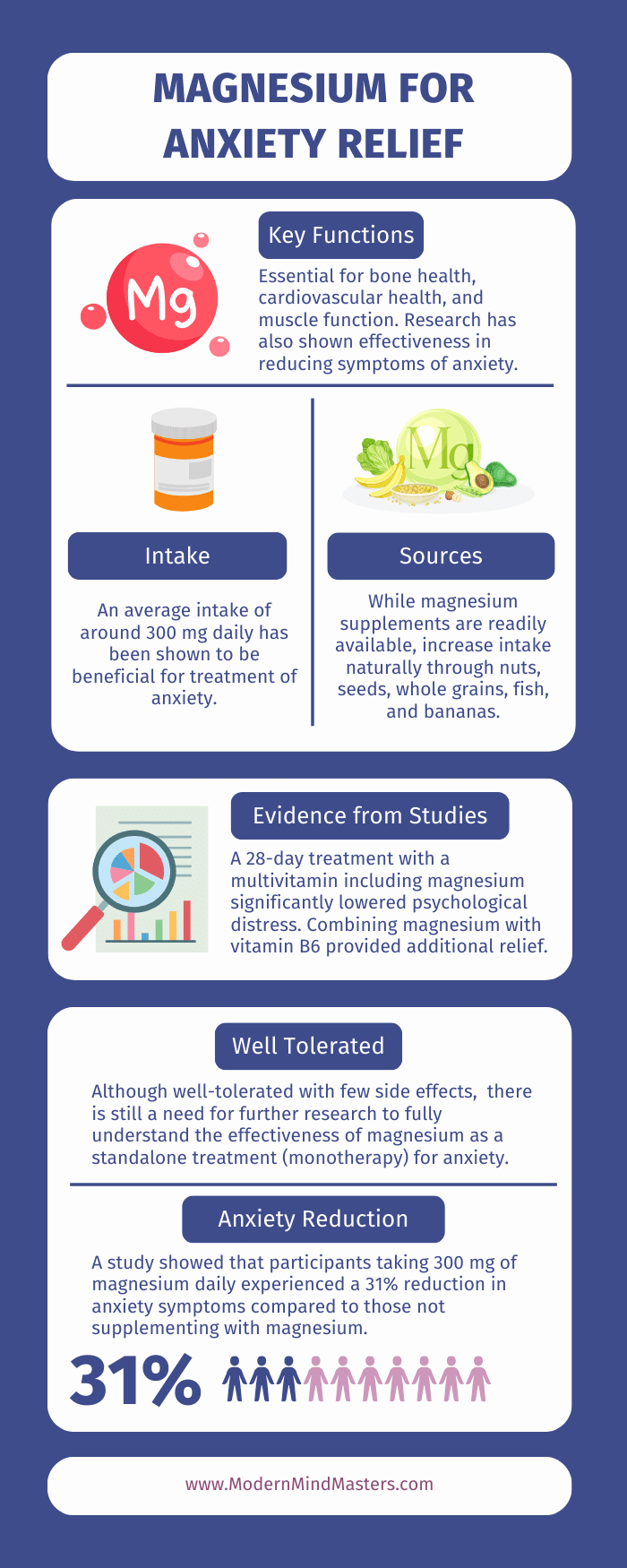
A review of randomized controlled trials (RCTs) reveals that 71% (15 out of 21) demonstrated positive outcomes, with only mild to moderate side effects reported, suggesting that nutritional and herbal supplements could be effective in treating anxiety and related conditions, with a lower risk of severe side effects. However, the efficacy of each specific supplement and treatment approach varies.
Passionflower, an age-old supplement used for centuries, consistently shows beneficial effects, supporting its use as an anxiolytic (anxiety-reducing) agent.
Kava, one of the most extensively studied supplements, demonstrated a significant reduction of anxiety symptoms in 63% (5 out of 8) of the monotherapy RCTs. This indicates strong evidence for its use in treating Generalized Anxiety Disorder (GAD), non-psychotic anxiety, and other related conditions.
The results for St. John’s wort were more variable; half of the studies yielded positive outcomes. Notably, only one of the four RCTs focusing on St. John’s wort alone showed a positive effect, and this was in combination with valerian, suggesting that St. John’s wort by itself may not be advisable for anxiety disorders.
Combination supplements containing L-lysine or magnesium also show potential. Both RCTs examining combinations of L-lysine and L-arginine yielded positive results, pointing to their potential utility in anxiety treatment, although evidence remains limited.
The findings on magnesium are mixed. While all three RCTs involving magnesium supplements showed positive outcomes, magnesium alone did not perform better than a placebo. This raises questions about its standalone effectiveness as an anxiolytic agent and whether its benefits are due to other combined nutrients or herbal extracts.
Recent research has shown that passionflower, kava, St. John’s Wort, L-lysine with L-arginine, and magnesium demonstrate the potential for anxiety management benefits.
Research has shown that both herbal and natural supplements can reduce the symptoms of anxiety, including passionflower, St John’s wort, and magnesium.
Magnesium potentially reduces anxiety by affecting neurotransmitter function and stress response, showing promise in combination therapies but requiring more research for standalone efficacy.

Dopamine is a neuromodulator that acts as a messenger between neurons. It determines the amount of motivation and drive to achieve something and leave our comfort zone.
Social media can be highly addictive in nature due to its proclivity for likes, comments, and followers, all of which engage our dopaminergic systems.
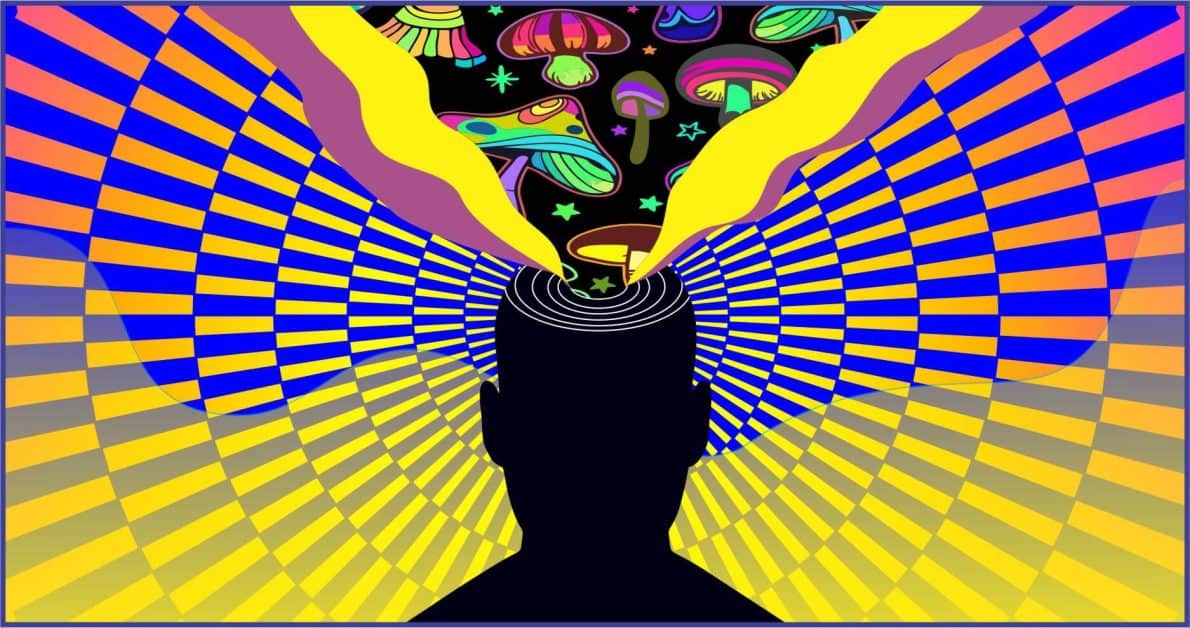
Psilocybin can help treat mental health by altering neural connections, reducing activity in parts of the brain causing anxiety, allowing new healthier connections to form.
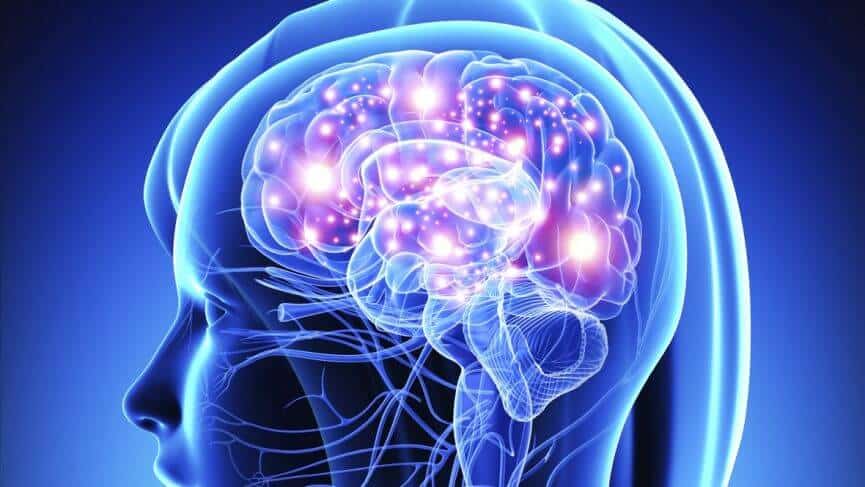
Goals are easy to set but often difficult to follow through with. Learn the neuroscience behind behavior change and how to use it to your advantage to set unbreakable goals.

The 5 best evidence-based supplements for anxiety include passionflower, kava, St John’s wort, L-arginine, and magnesium, according to recent research.

Ketamine, through ketamine therapy, has been shown in clinical settings to benefit mental health, specifically depression and other mood disorders.
© 2025 Modern Mind Masters - All Rights Reserved
You’ll Learn:
Effective Immediately: 5 Powerful Changes Now, To Improve Your Life Tomorrow.
Click the purple button and we’ll email you your free copy.